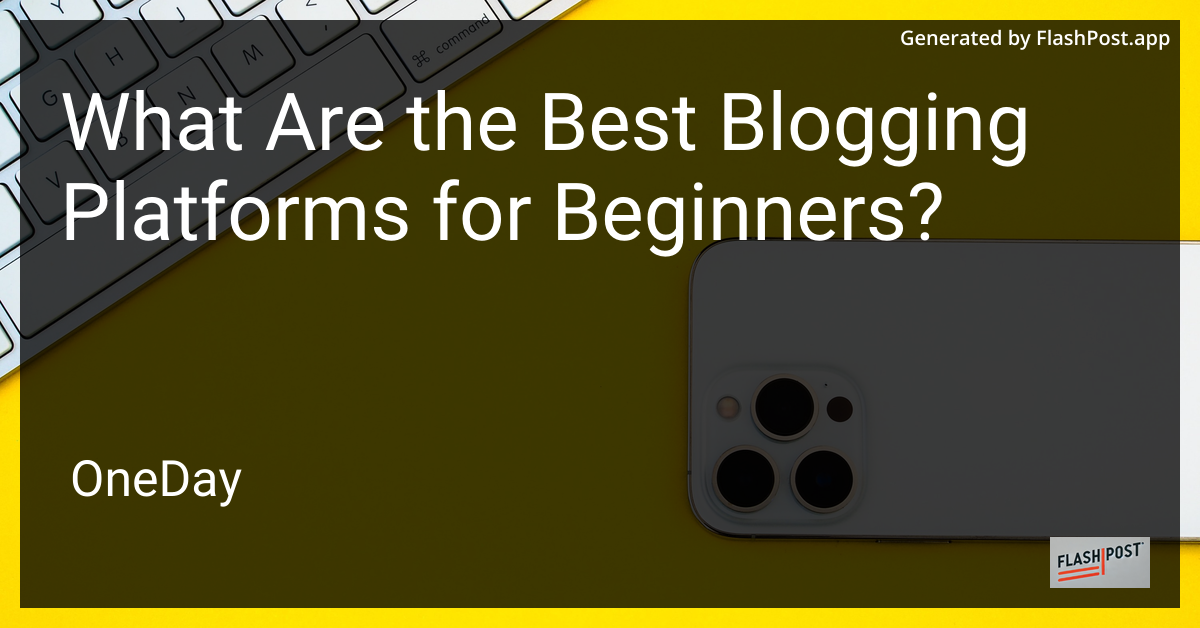
Starting a blog is an exciting journey that opens up opportunities for sharing your ideas, expertise, or hobbies with a wider audience. However, choosing the right blogging platform can make all the difference for beginners. To help you get started, we've compiled a list of the best blogging platforms that are user-friendly, cost-effective, and provide great support for new bloggers.
1. WordPress.org
WordPress.org is one of the most popular blogging platforms available today. It's a self-hosted solution, meaning you'll need to arrange your own hosting service. Although this might sound challenging, it offers incredible flexibility and control over your blog. There are countless plugins and themes available to customize your site. For more detailed tips and tricks, check out these WordPress blogging tips.
Pros:
- Full control over your blog
- Extensive customization options
- Thousands of free themes and plugins
Cons:
- Requires a hosting plan
- A learning curve for complete beginners
2. Wix
Wix is a beginner-friendly website builder that allows you to create a blog through its drag-and-drop interface. No technical skills are needed, making it perfect for those just starting out. It offers a range of stylish templates that can be customized to fit your personal design.
Pros:
- Easy-to-use interface
- Customizable designs
- Quick setup process
Cons:
- Limited scalability
- Some features require a paid plan
3. Blogger
Owned by Google, Blogger is a free platform ideal for personal blogging. It’s straightforward to set up and integrates seamlessly with other Google services. While it doesn’t offer as many customization options as WordPress, it's an excellent choice for those who want to get started quickly without any investment.
Pros:
- Free to use
- Easy to set up and maintain
- Seamless integration with Google services
Cons:
- Limited customization options
- Less professional-looking themes
4. Shopify
Though often associated with e-commerce, blogging on Shopify can be an excellent option for those looking to integrate a blog with their online store. Shopify offers robust blogging tools and beautiful templates, perfect for businesses aiming to boost their content marketing strategies.
Pros:
- Ideal for integrating blogs with e-commerce sites
- Professional templates
- SEO-friendly features
Cons:
- Monthly subscription required
- Primarily designed for e-commerce
5. Medium
Medium is a platform built around simplicity and writing-focused design. It's great for writers looking to reach a broader audience, as it already has a vast reader base. You don’t get much control over your site's design, but it’s perfect for those concentrating on content quality and networking.
Pros:
- Large built-in audience
- Focus on content quality
- Easy to use interface
Cons:
- Limited customization
- Less control over blogging assets
Conclusion
Choosing the right blogging platform depends on your specific needs and goals. For those seeking full control and various customization options, WordPress.org is unmatched. If you are looking for simplicity and ease of use, Wix offers a great starting point. Meanwhile, Shopify is perfect for bloggers also running an online store. Remember, the best platform is one that fits your blogging vision and requirements. If you're considering monetizing your blog, understanding the guest blogging rates for 2023 can also be helpful as you plan your content strategy.
Embark on your blogging journey today with the platform that best suits your style and needs!